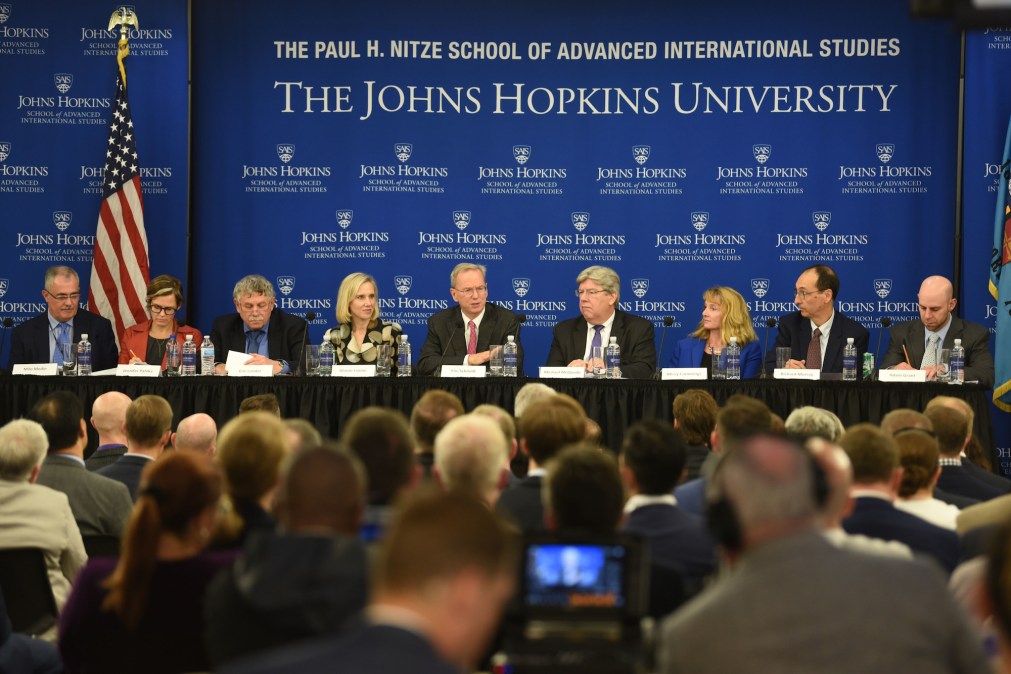Eric Schmidt and other founding Defense Innovation Board members depart

Founding chair Eric Schmidt and other members of the Defense Innovation Board ended their terms on Tuesday.
During a public meeting in which the board broadened its cadre of subcommittees to include a new space panel, Schmidt and others — such as Code for America founder Jen Pahlka, LinkedIn co-founder Reid Hoffman and Aspen Institute founder Walter Isaacson — were given a farewell and some offered closing recommendations. They had served four years on the board, which is the term limit established by the board’s charter.
During the first iteration of the DIB led by Schmidt, many of its ideas became cornerstones of DOD’s technology policy. The advisory committee helped create Artificial Intelligence ethics principles, a recently adopted software acquisition model and other lasting changes to how the DOD approaches emerging technology.
During his final meeting, former Google CEO Schmidt was credited as critical to the board’s success.
“Standing up new organizations are very tricky … it is not trivial to find a way to chart a path forward and be influential,” acting Undersecretary of Defense for Research and Engineering Michael Kratsios said about Schmidt and the board’s work during a special appearance at the meeting.
Kratsios added that one of the board’s biggest contributions was the year-long process of recommending to the DOD its new AI ethics principles. Secretary of Defense Mark Esper adopted the principles as DOD policy almost in their entirety.
“It has been fantastic to work with you … I had no idea that the DIB would be as impactful or successful as it has come to be,” Schmidt said.
Mark Sirangelo, entrepreneur scholar in residence at the University of Colorado Boulder, took over for Schmidt at the meeting as the new DOD-appointed chair Tuesday. And the board added at least one new member to its roster: Andrew Endy, a Stanford biology professor.
After bidding farewell to the departing members, the new board took on some official business, starting with broadening its work with a new space subcommittee to help support the newly formed Space Force.
While Sirangelo did not name the subcommittee’s members, famed astrophysicist Neil deGrasse Tyson is a board member and likely to participate in the space work.
“Many people look at the rockets and spaceships, and that’s what they see [in space], but it is so much more,” Sirangelo said. He added the need to protect networks, communications systems and geospatial information as critical work the board will focus on in helping the Space Force stand up.
At the meeting, the DIB also discussed and adopted recommendations on topics it regularly comments on. It reiterated the need for a “digital people officer” and for the DOD to take advantage of the ongoing state of remote work to improve recruitment and retention of digital talent. The DIB’s Workforce, Behavior and Culture Subcommittee recommended that the DOD fully adopt a culture of remote work.
“People will do it if they see others doing it, particularly if they see leaders” working from home, Pahlka said during her final meeting.
The development of testing, evaluation and validation software for AI was another topic of discussion. The consensus among members was that AI-specific tools and broad training were needed, as there are “no proven effective methods for testing nondeterministic systems.” The board adopted a resolution to continue working on making specific recommendations to the DOD, which is currently working on its own testing and evaluation methods.




